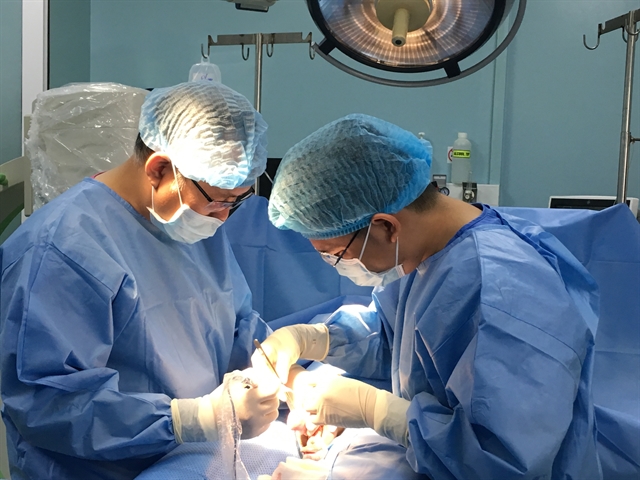 Society
Society

A 19-year-old man from Lâm Đồng Province came to Bình Dân Hospital in HCM City recently with an unusually large and hard lump in his right scrotum.

|
| A surgery at Bình Dân Hospital in HCM City. Photo courtesy of the hospital |
HCM CITY — A 19-year-old man from Lâm Đồng Province came to Bình Dân Hospital in HCM City recently with an unusually large and hard lump in his right scrotum.
Doctors at the andrology department diagnosed him with testicular cancer and said it had spread to other parts too.
They advised him to store his sperms before surgery to remove the testicle with cancer and chemotherapy.
According to the hospital’s statistics, the incidence of testicular cancer increased in both 2017 and 2018: 63 patients were admitted in 2017 and 78 last year.
Many of them were between the ages of 16 and 19.
Assoc Prof Dr Phạm Hùng Cường, head of the surgery department No.2 at the HCM City Oncology Hospital, said people with testicular cancer are younger than other cancer patients.
“The cancer is in the list of common children’s cancers.”
He advised parents to watch out for unusual lumps in their sons’ testicles since it could mean cancer and bring them to doctors for examination.
The lumps are usually not painful, meaning people often ignore them, not realising they could be cancerous.
Adults should also do this, Cường said.
Many children with the cancer are congenital, he told Việt Nam News.
Testicular cancer accounts for 1 per cent of all cancers among men.
According to global cancer database GLOBOCAN, it ranked 33rd in Việt Nam last year with 207 new incidences.
The number of mortalities was 74, the 35th highest of all cancers.
According to Cường the cure rate is 100 per cent if treated at the early stage, and so patients should not be worried. Chemotherapy is very effective and even those in whom the cancer has spread widely can be cured with just two or three sessions.
Dr Trần Đoàn Thiên Quốc of Bình Dân Hospital said the survival rate five years after treatment is 95 per cent.
But Cường said testicular cancer reduces the quality of life and causes infertility because the testicle with cancer cells is removed to prevent their spread.
Quốc said the risk of getting testicular cancer is high when patients have an undescended testicle or have a family history of this cancer.
Cường said patients with an undescended testicle are often advised to get a surgery done to move it into the scrotum.
Quốc said blood tests for tumour markers, abdominal ultrasound and other means could be used to detect the cancer.
Doctors at Bình Dân Hospital also provide counselling to patients on sperm storage in future. — VNS




